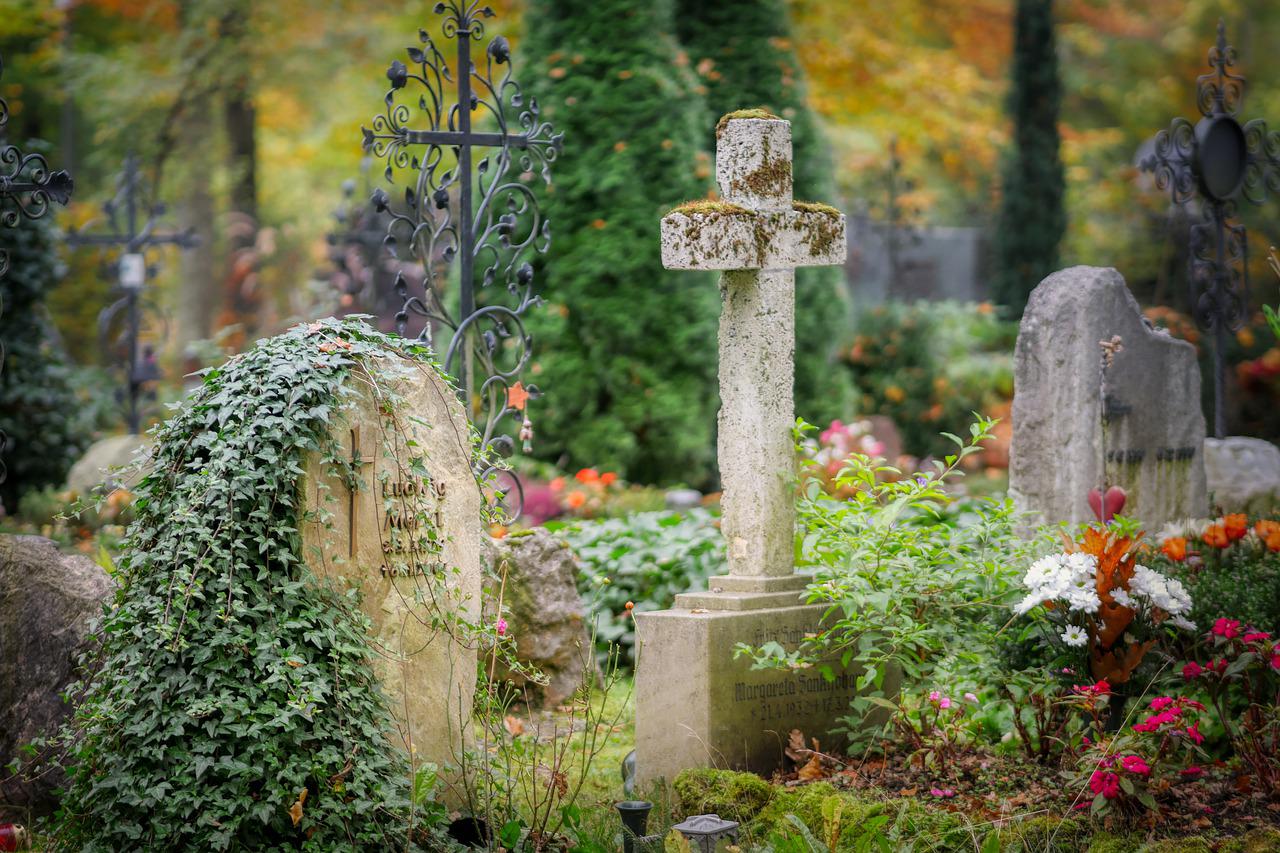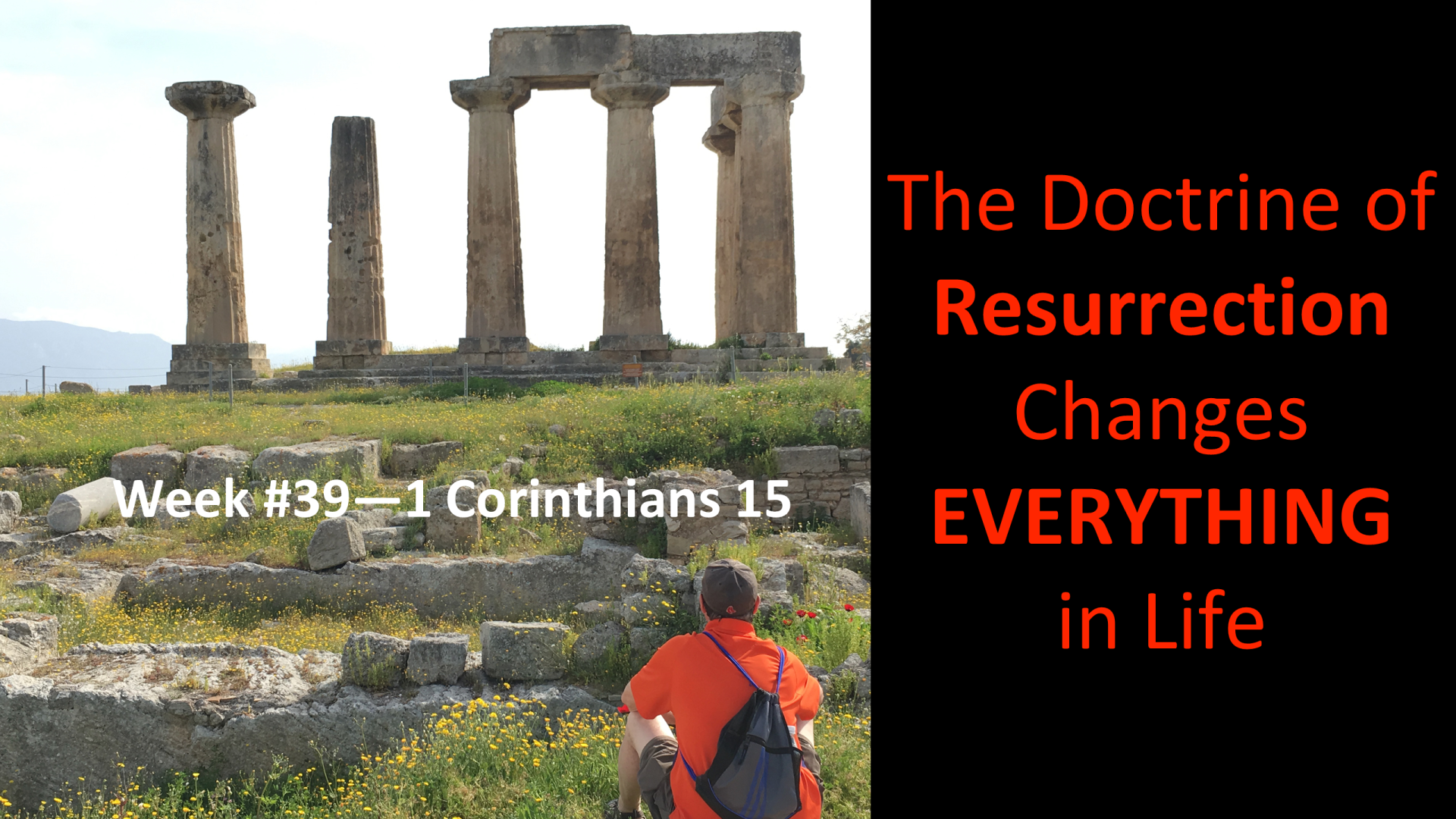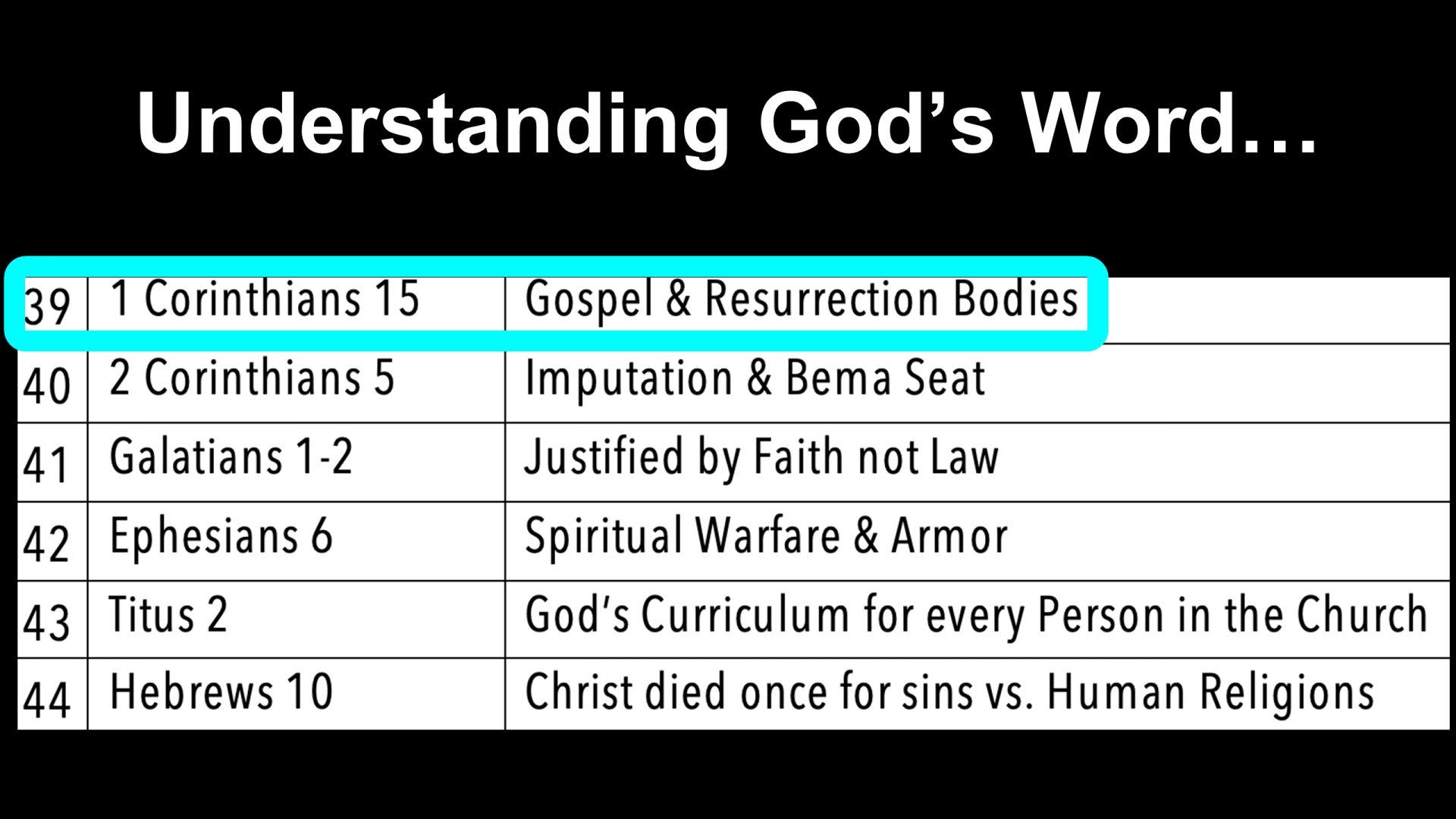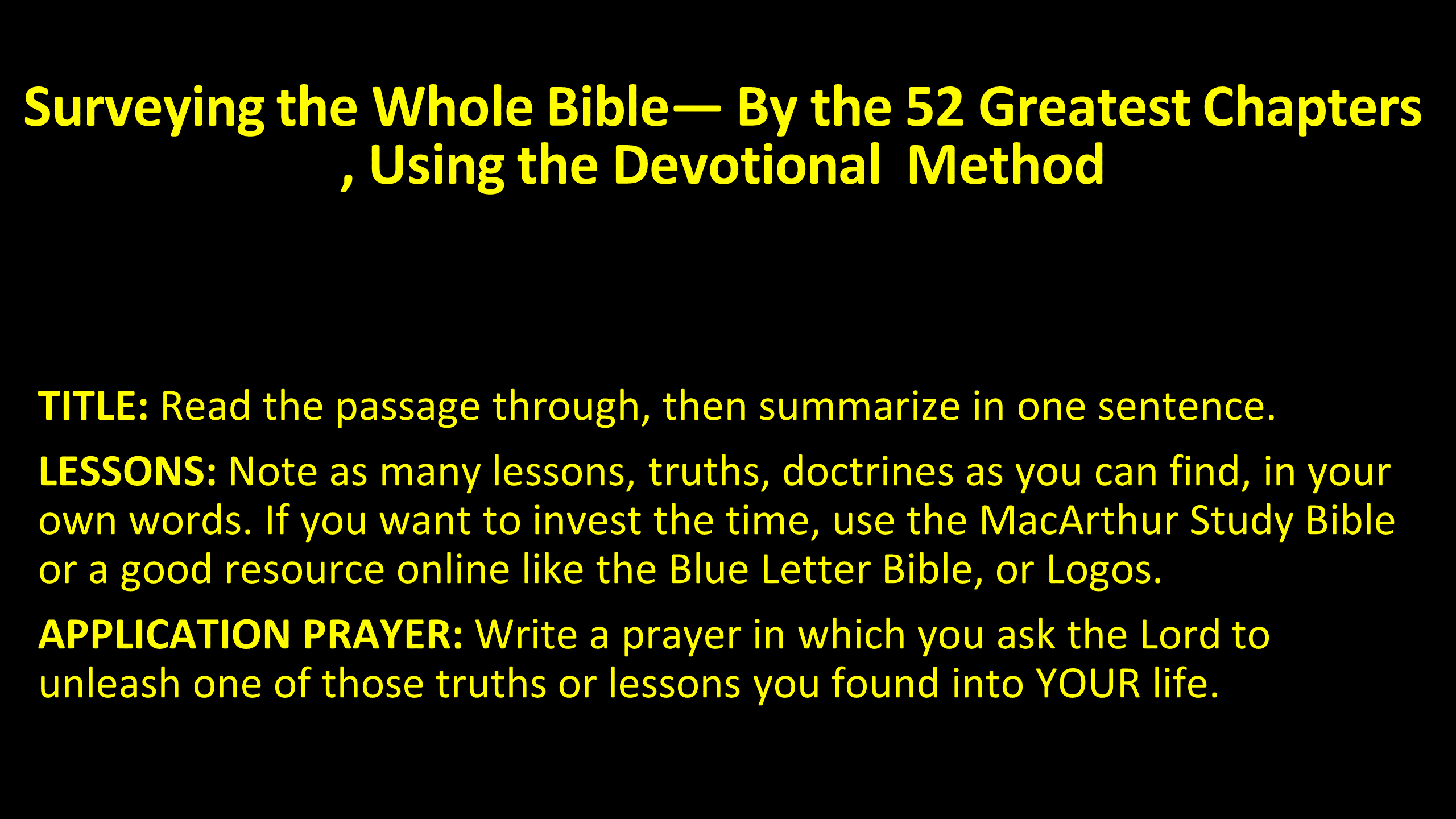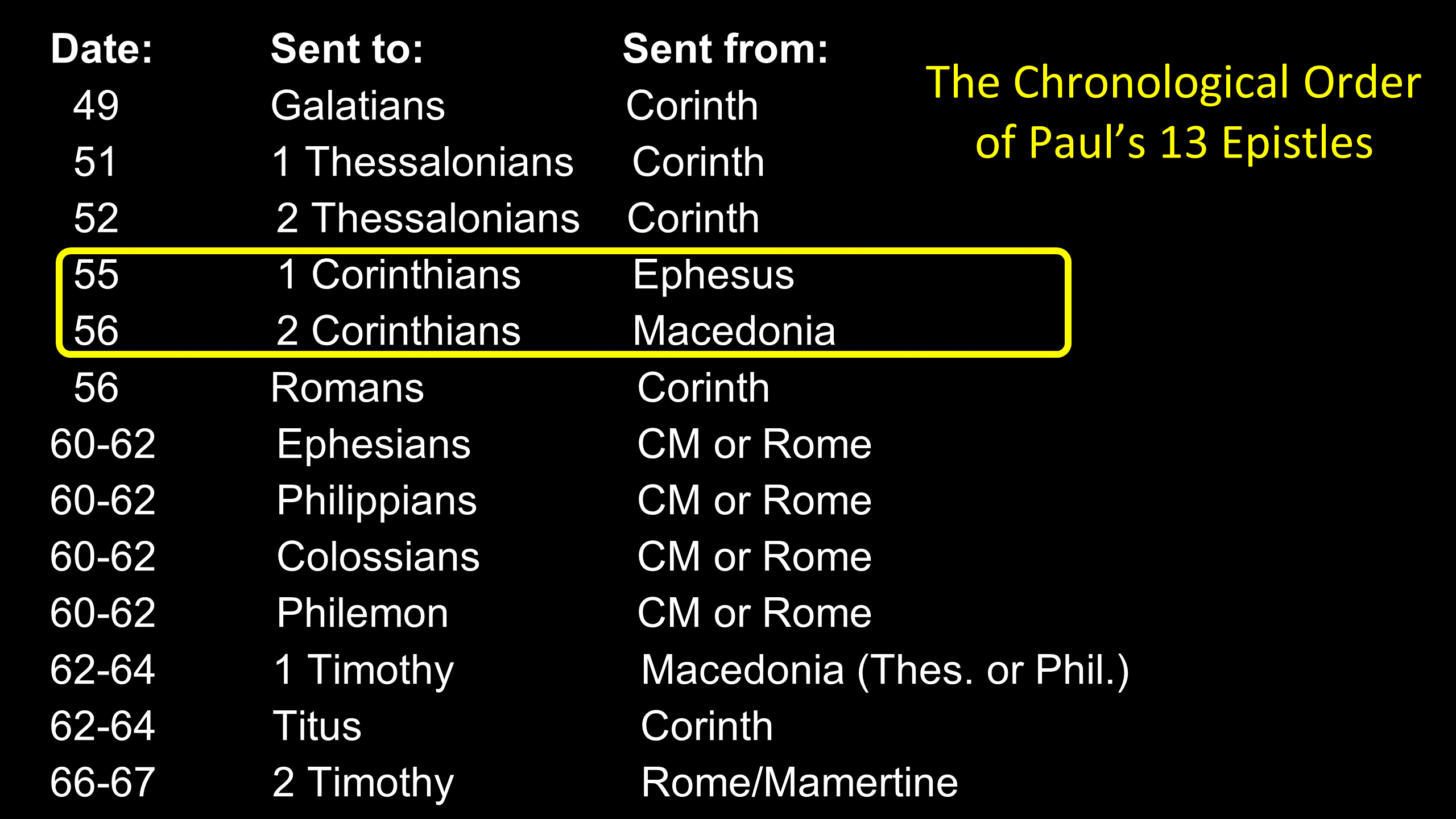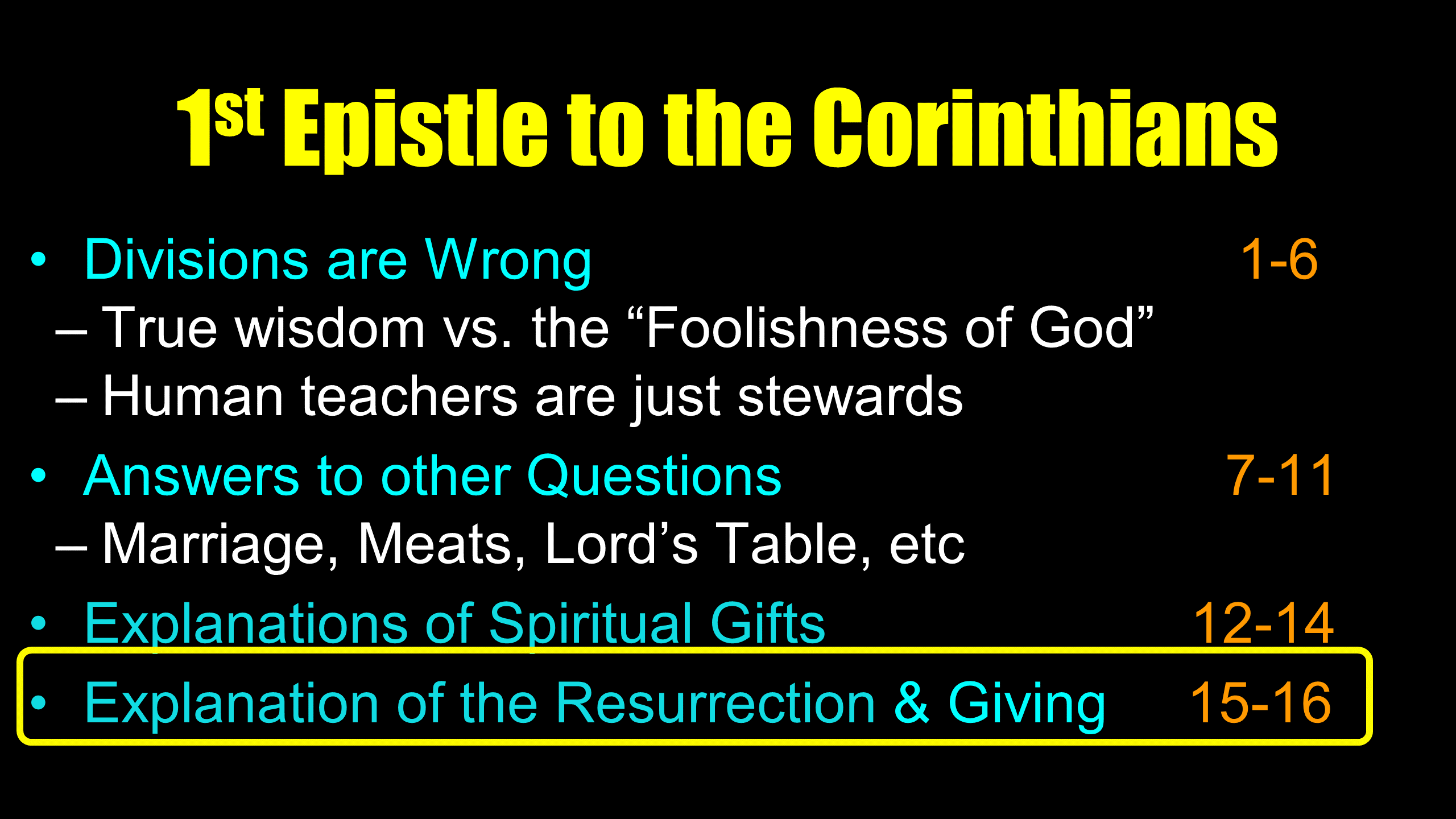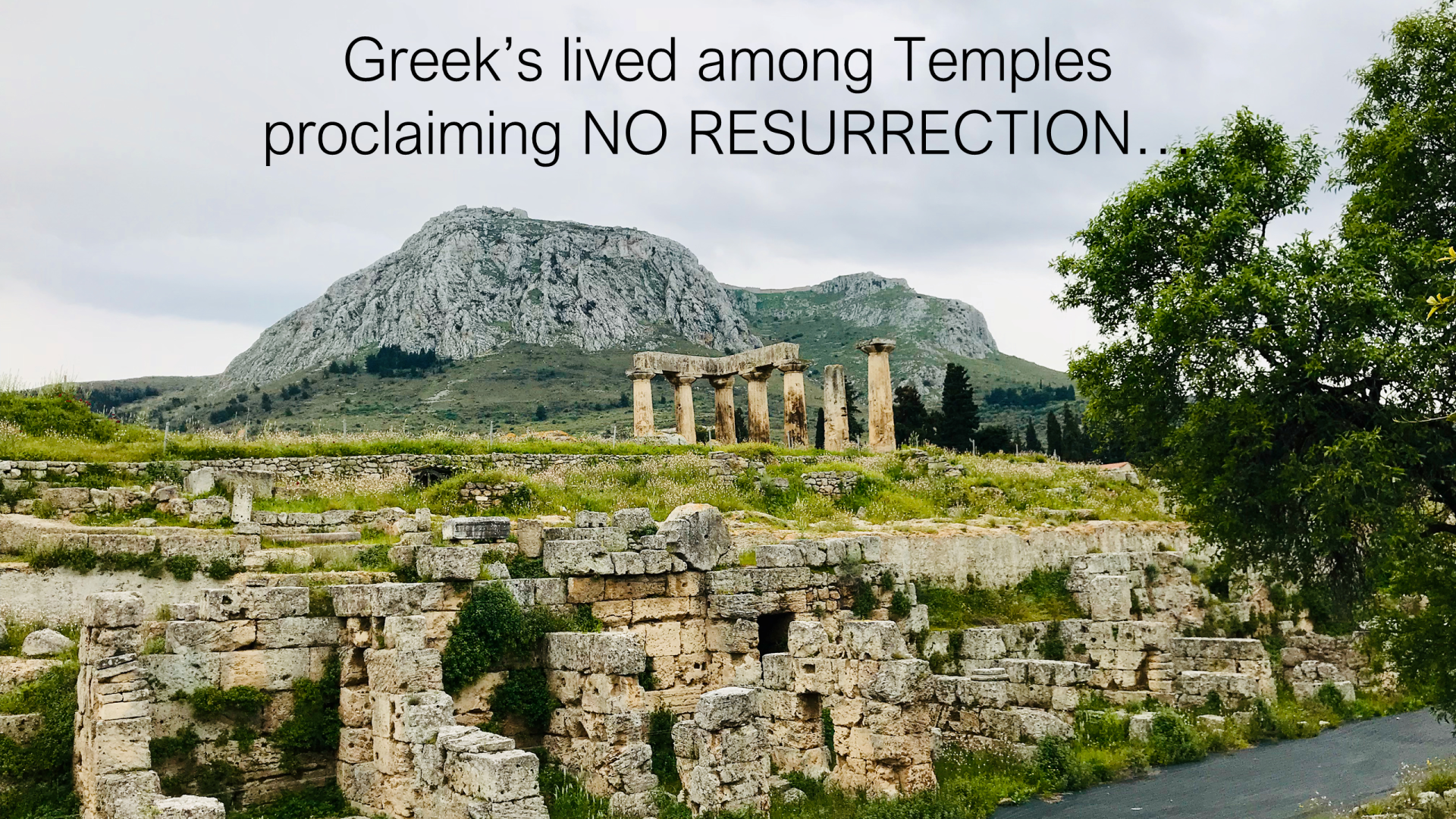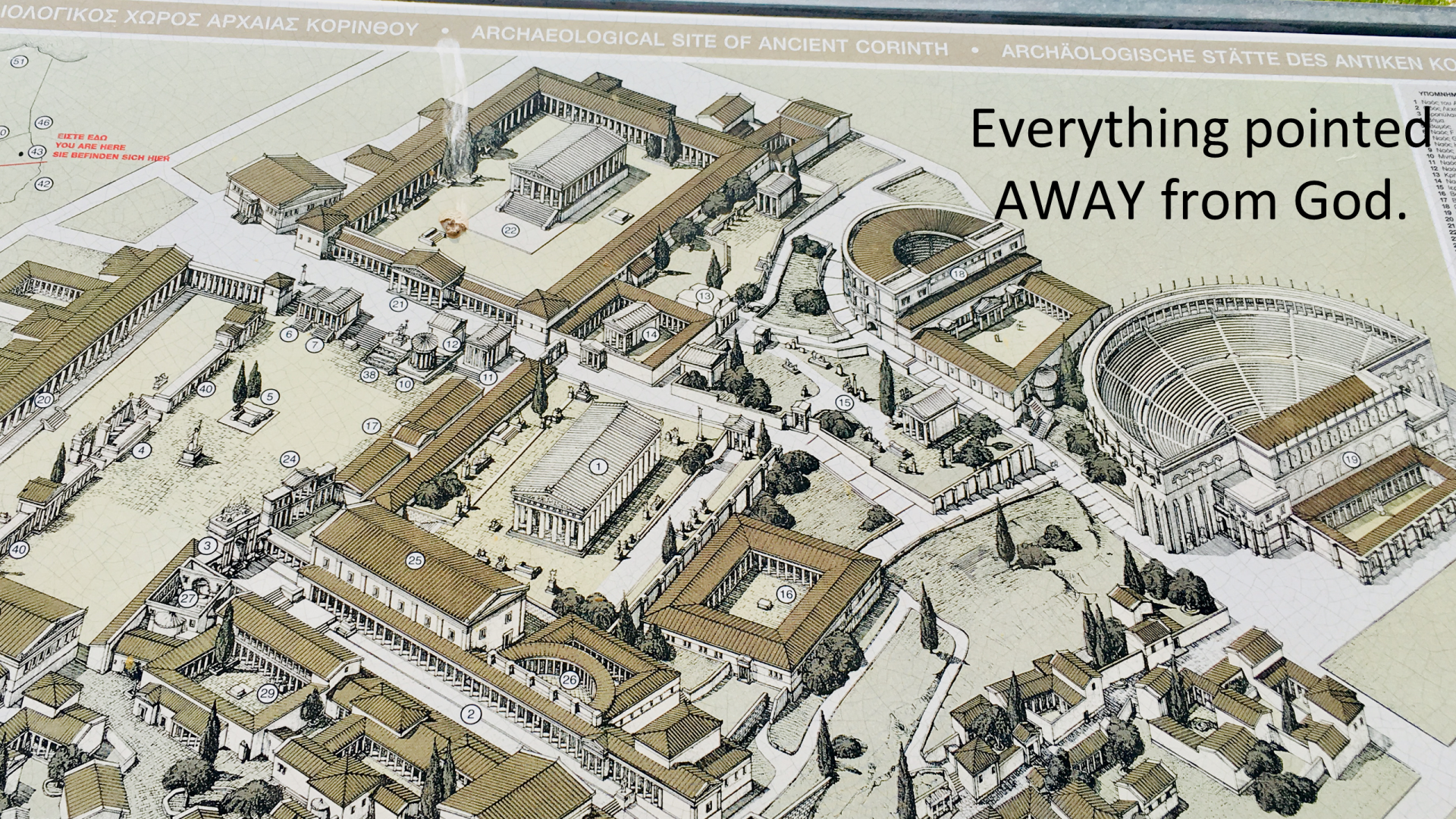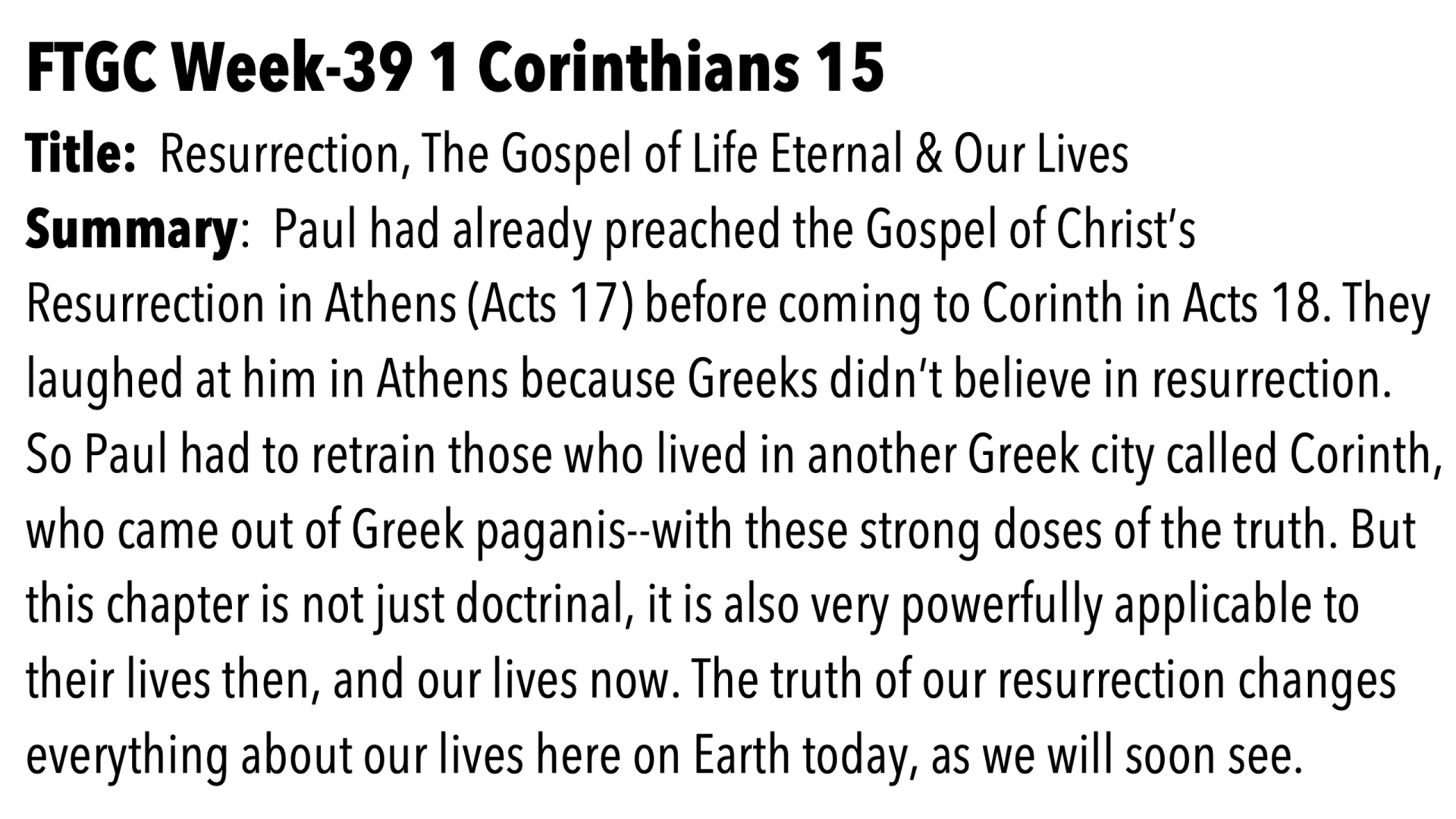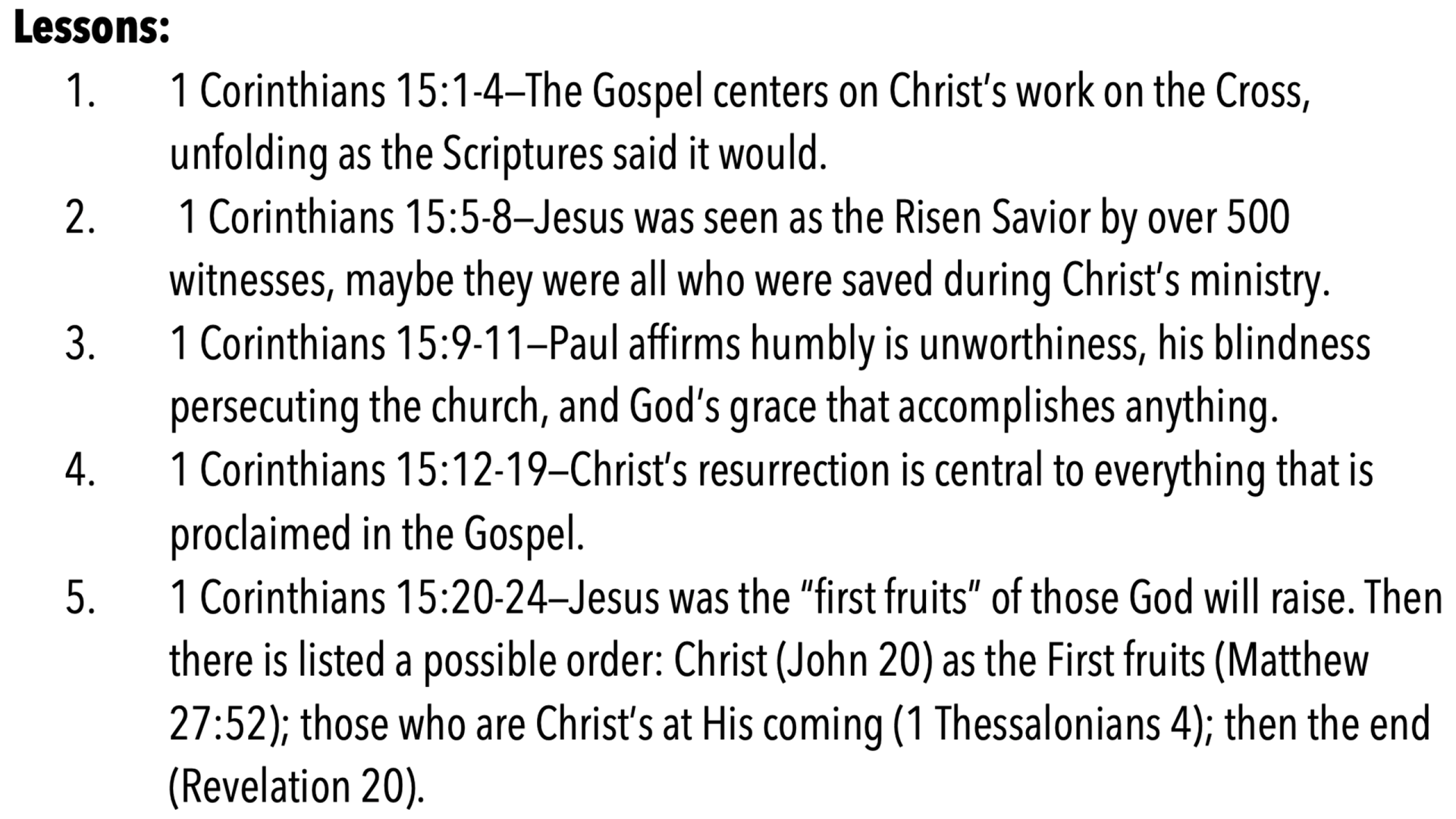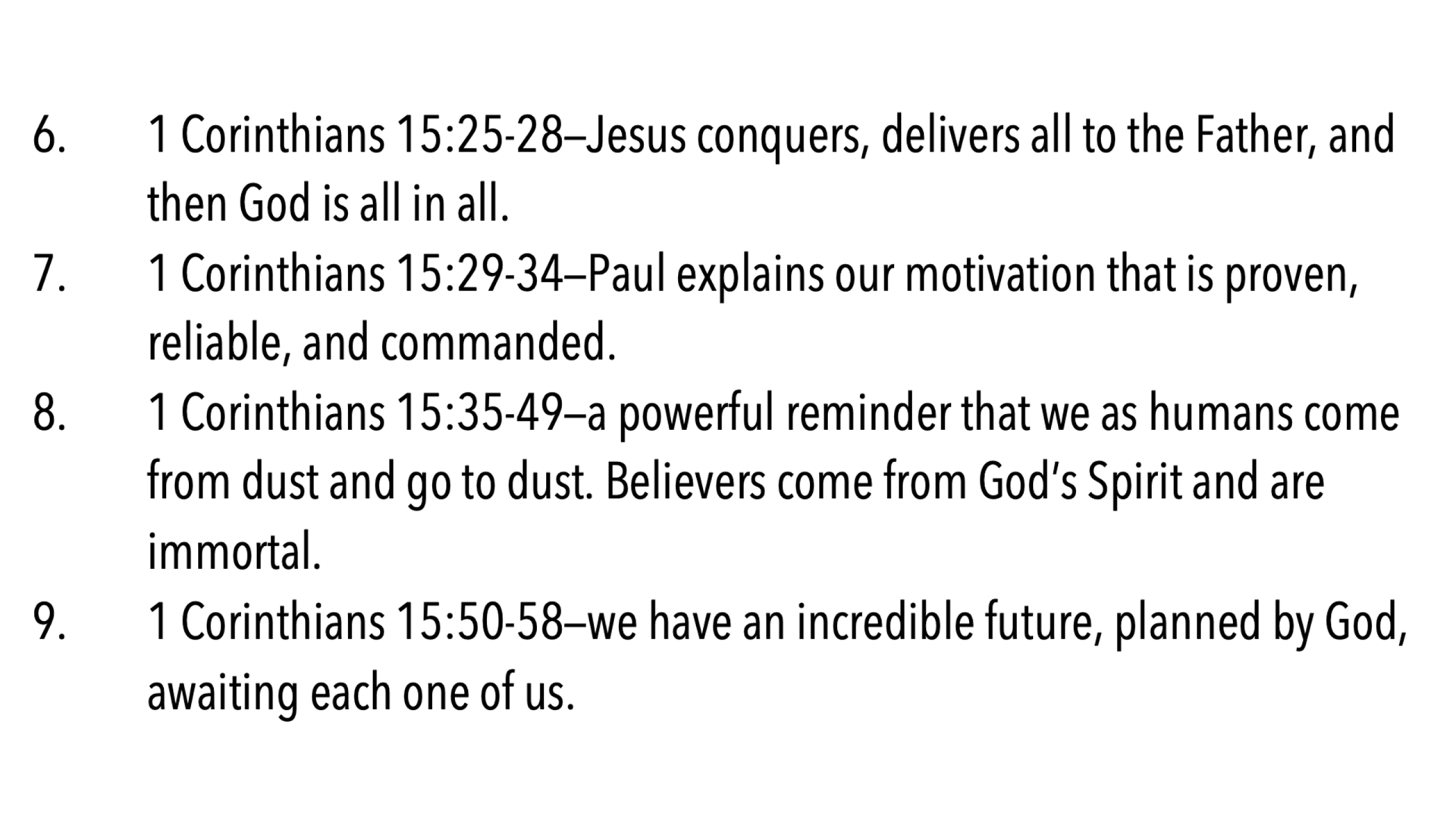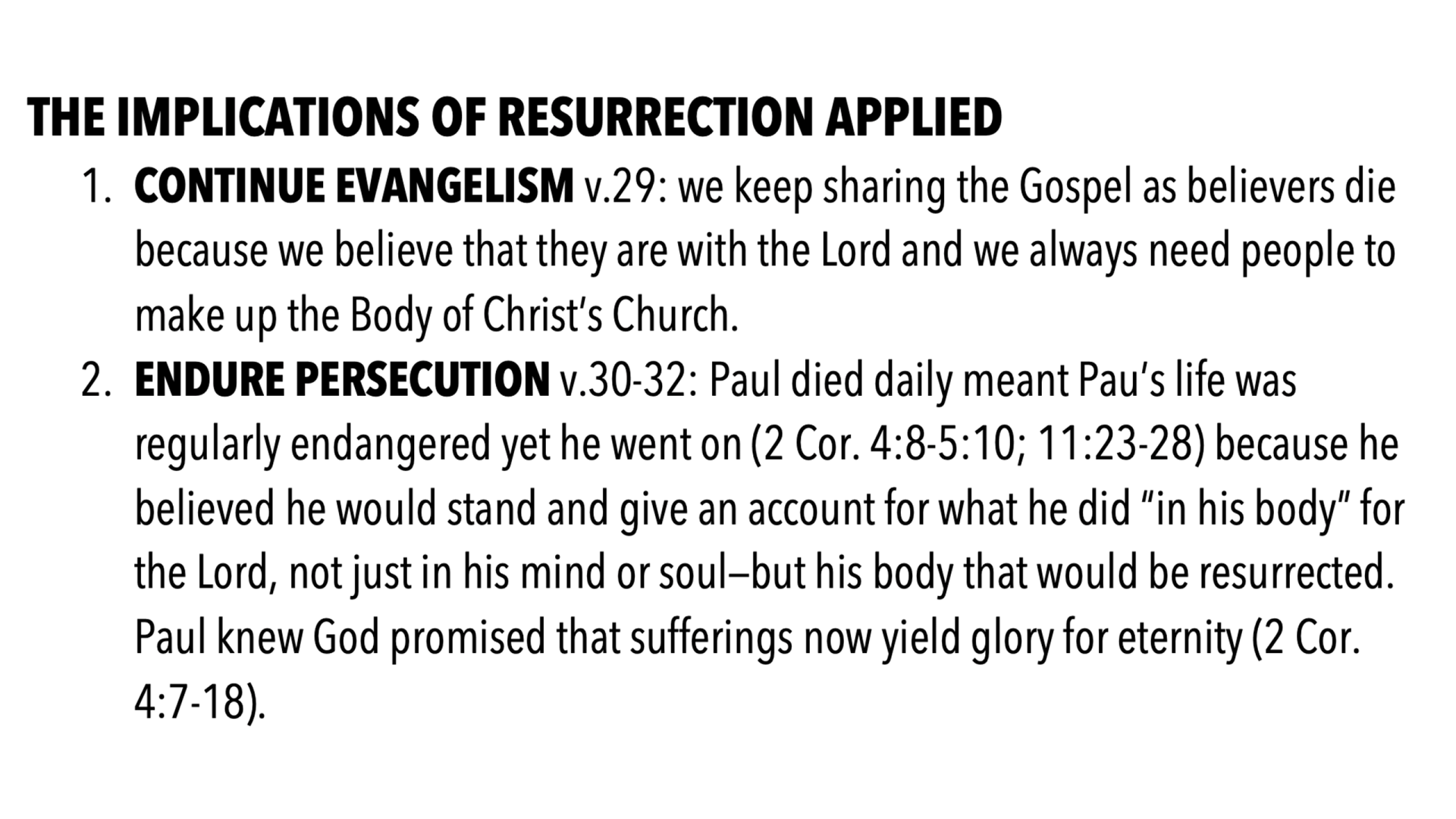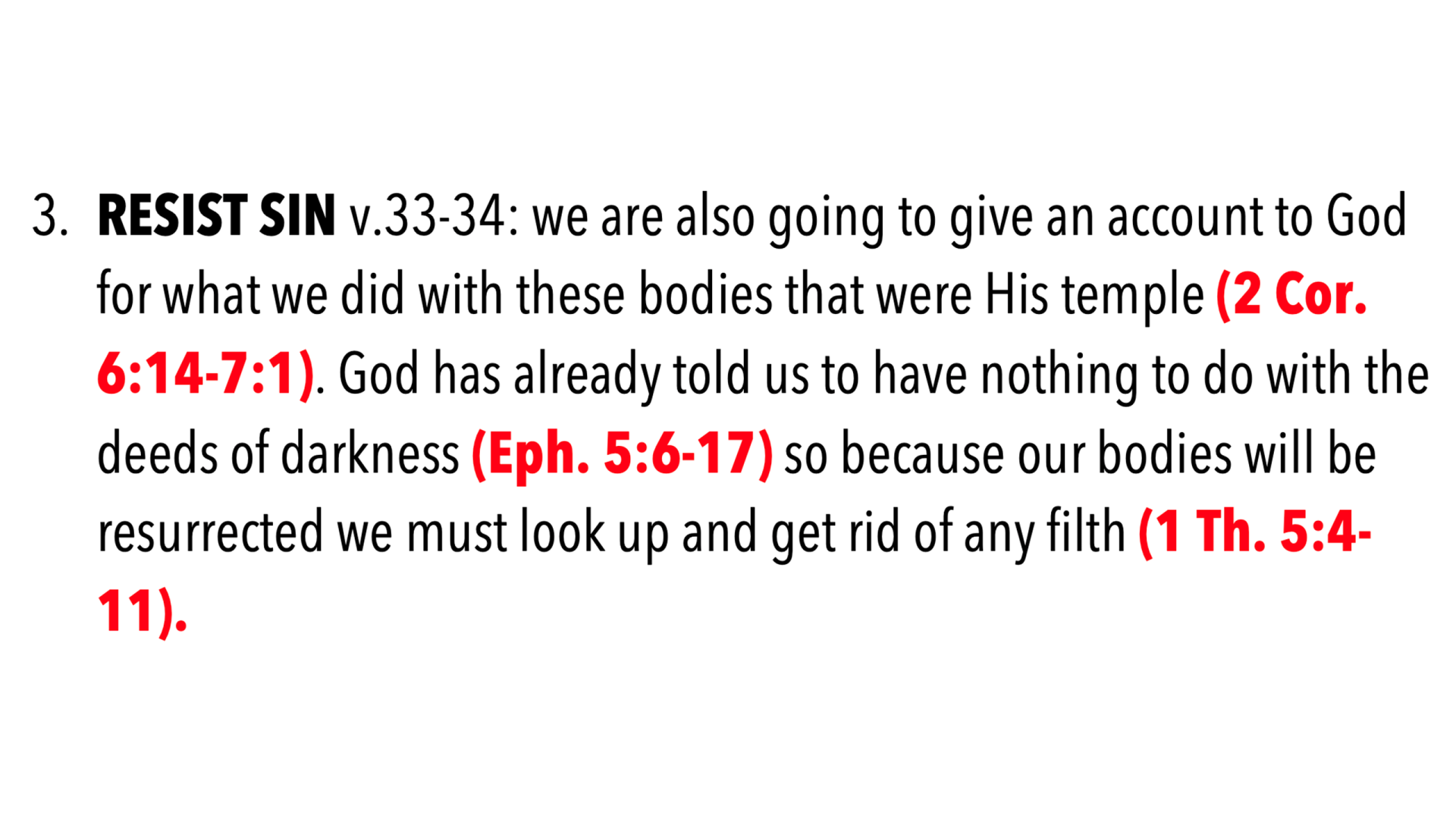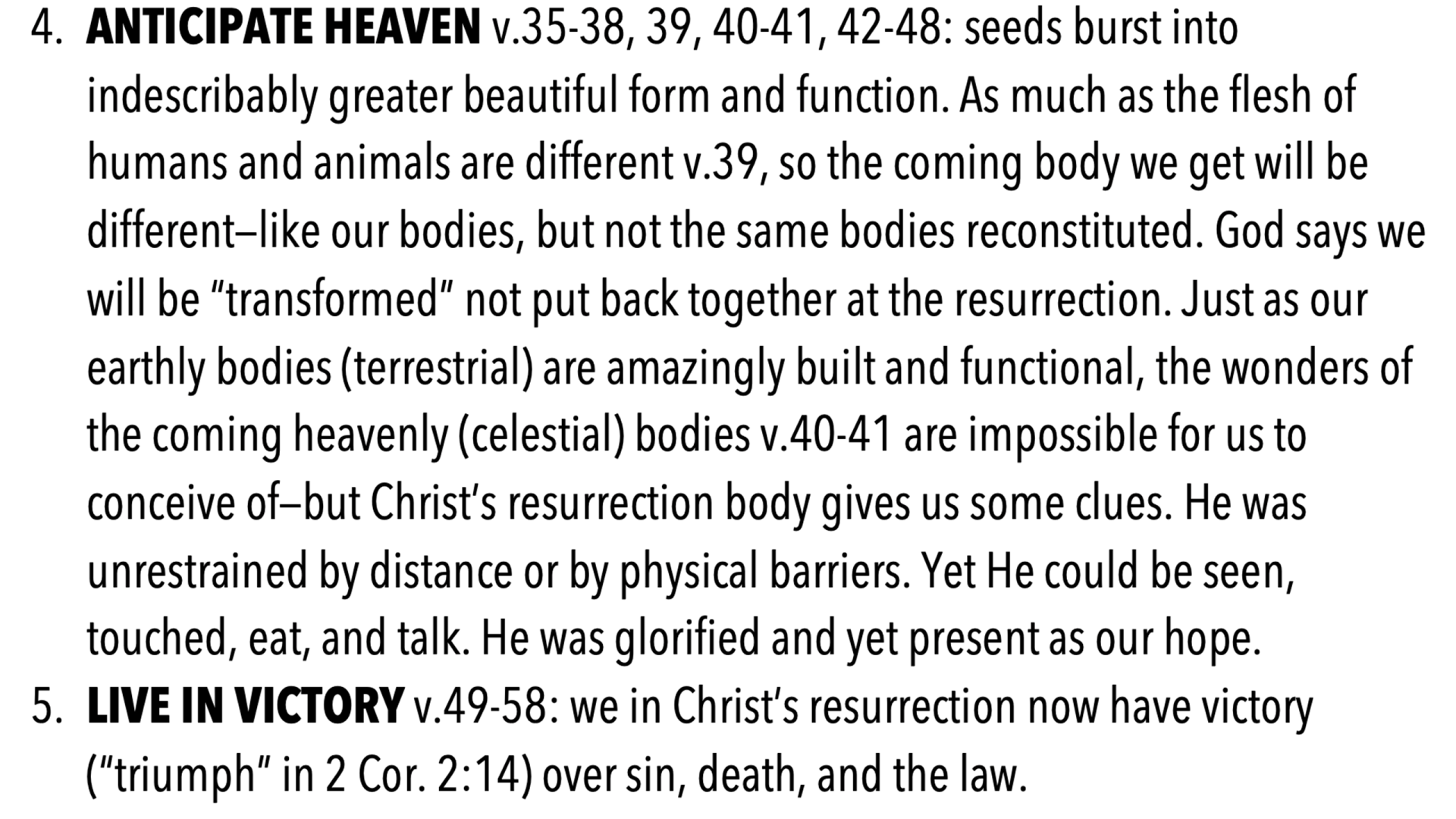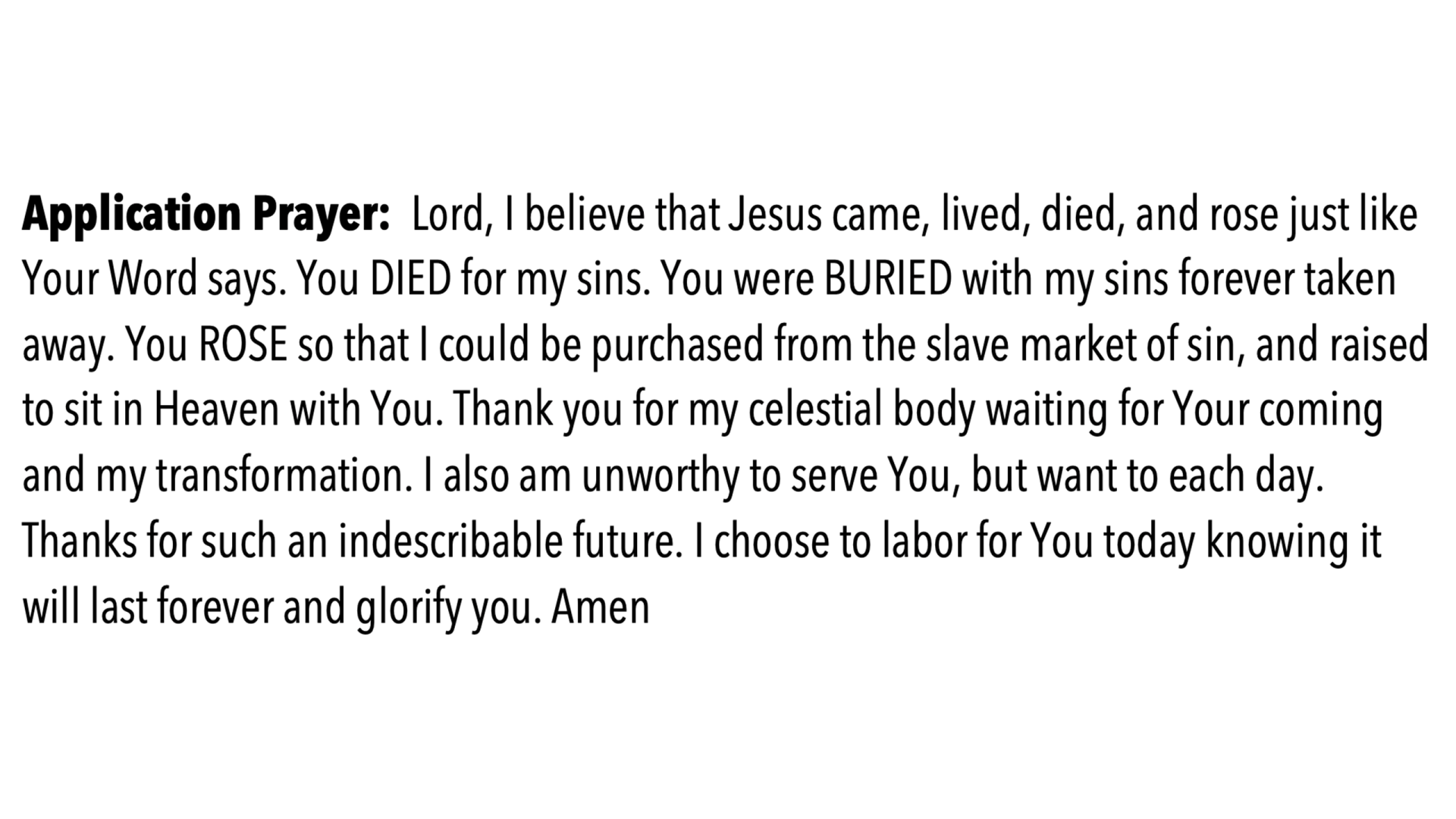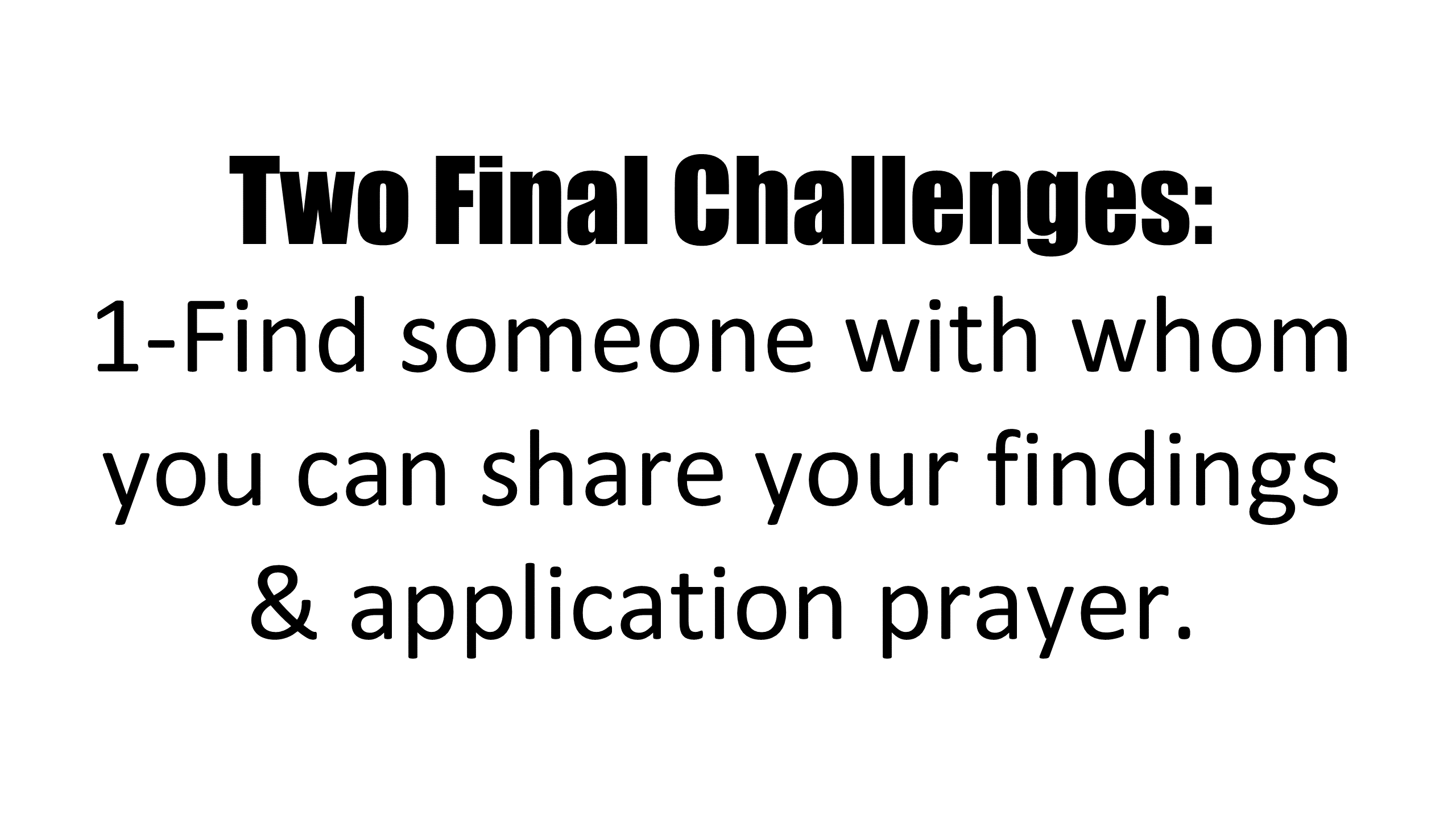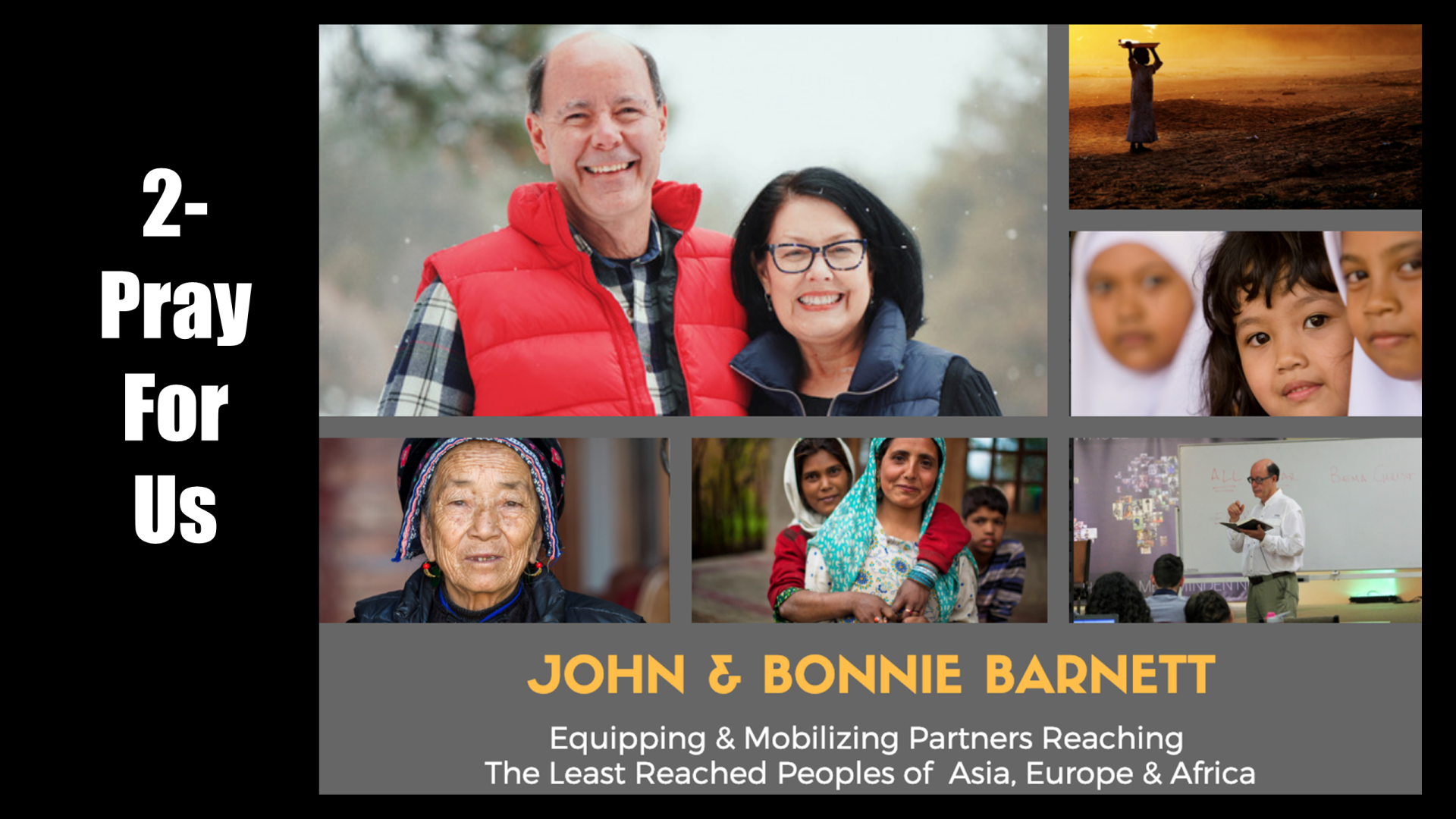If the YouTube video above is not available, here are two other ways to view:
Transcript
Welcome to the 52 greatest chapters of the Bible. John Barnett here, grab your notebook and your Bible. We’re going to go through, as you see on the slide, 1 Corinthians 15 and this is the title I’ve given it. Remember I title the chapter each day as I read through it. Then I keep one of them as my final title. The doctrine of resurrection changes everything in life. That’s truly what I came to at the end after thinking about Paul’s argument in this 15th chapter. 1 Corinthians 15 is the longest doctrinal treatment of resurrection in the whole Bible. It’s like the primary document for everything we believe about resurrection. The reality of the resurrection, the means of resurrection, the byproducts, and other words that God said. There’s going to be celestial and terrestrial bodies and we’re going to have this new creation that God has made for us in Heaven, it’s waiting for us. We have a reservation to have that body.
I want to take just a moment to tell you about your journal. I always remind you that you can go to our Facebook page and download these two sheets that I have written in mine. I see in the comments that some of you are brand new to us. Over here, the chapters we’re covering, and over here, the method we use. Then, going to my journal on 1 Corinthians 15, you write primarily what you’re finding as you read the scriptures, and I’ll talk about that in just a minute.
The picture on the slide is the temple of Apollo and some of you aren’t much into Greek mythology, but the whole world was into Greek mythology, the whole Roman world. The sun god was the one who people went to find out about the future. If you’ve ever heard of the Oracle at Delphi, that oracle was the mouthpiece of this god Apollo. Do you remember what Paul says in 1 Corinthians? He tells us that behind every idol there is a demon. If people want to know the future, then Satan would empower the demon to tell them enough things because remember demons are better than the KGB, the CIA and the Mossad put together. A demon is a super intelligent spirit-being that doesn’t die, that doesn’t sleep, that knows every language, that can go through any structure and listen to everything. They’re not stopped by any barrier, and they can listen. They remember so you talk about being able to tell the future, Satan’s oracle could almost tell the future just by knowing what no one else could know. Like where armies were because they heard what their plans were as they were spying them out. That temple of Apollo that you see there, and the reason I keep putting that there that’s sizable competition for the Gospel. Of course, Greeks did not believe in a resurrection. Everything we’re studying in 1 Corinthians 15 goes against the whole culture that Paul was ministering to.
Remember where we are, we’re in our 39th week and we’re looking at the Gospel and resurrection bodies. It’s going to be very exciting. It was very motivating to me this week, studying the resurrection. Next week, Lord willing we’re going to be on imputation, perhaps one of the greatest doctrines of salvation. If this is Jesus Christ, He came to me and took with Him all of my sins and imputed them to His account. Then He comes back and imputes to me, His righteousness. Imputation is like the digital deposit to your account, like you have direct deposit. That’s what imputation is, direct deposit and direct withdrawals. Christ directly withdrew my sin from my account and directly deposited His righteousness. Amazing.
We’ll look at Galatians and justification, spiritual warfare, talking about those spirit beings I just said that are everywhere listening, knowing every language deceiving spirits. That’s going to be week 42, then, wow, Titus 2, one of my favorite passages in the Bible. Then we get to Hebrews 10, which talks about Christ dying for sin once and human religions. This whole method that you’ve just dropped in on, or you’ve been with us for a long time, is a survey of the whole Bible. It’s an active survey that’s why we have this journal with us. If you want to know what kind of journal and what kind of Bible, and if you want to know about this study Bible I refer to, all of that’s down in the description of this video on YouTube. You can find out all about these tools and pick any that you want to use. Even some of the books we use to study the Bible, but we’re surveying the whole Bible in one year and you’ve just come to the 39th week. That means that we’re ¾’s of the way, because 3×13 is 39 and 4×13 is 52, so we’re ¾’s of the way through the Bible of the 52 Greatest Chapters.
This is the key, and this is what I’m trying to encourage you to do. This is like the pep talk before the game. The game is you studying all week long, using your tools, going through, and reading 1 Corinthians 15 each day. As you read through the passage, write down as many lessons, truths, and doctrines as you can find. When you come to a hard verse you get your study Bible, the MacArthur Study Bible, and you look up that passage and you try and figure out how he came to that conclusion, looking at all of his footnotes and cross-references. It’s an integrated study but look at this last part of the slide. This is what makes it devotional. See, this is the connection right here. All the studying is just academic until you do this, write a prayer in which you ask the Lord, who’s the author of the word of God, He’s the energizer of His word in our lives, He sanctifies us. Remember John 17:17, we’re sanctified by the truth of God, which is the word of God, and it sanctifies us. This is how we do that through this prayer. We say, Lord, I want You to unleash this truth or lesson in my life. I’m going to show you my prayer from this week that I’ve written out. I type it so that you can see it. I pray that as my offering to the Lord of gratitude for what He’s done but asking Him to change me. As long as we’re on this side of glory, we need to be changed every day.
It reminds me of when we lived on the east coast. I pastored with my wonderful wife Bonnie, at the beginning of our little family, in Rhode Island, the ocean state. The ocean is everywhere present, and salt eats anything metal. You were constantly wire brushing and scraping and repainting anything metal. Whether it was your mailbox or your equipment on the deck, your table, your grill. Whatever is metal is constantly being corroded by that salt. This is the way the truth of God, the sanctifying change in our life, is like scraping and repainting so we can be more useful to the Lord every day.
Next slide. As part of our study, I want you to see all these epistles we’re looking at in the order they were written. Paul’s first two epistles were the Thessalonian epistles, but look where he was when he wrote them. Where we are. Paul was in Corinth writing back to the city, the church that he had just come from. That was his normal pattern. He would write back after he moved on and answer their questions. That was early on 52, 53 AD. In 57, Paul is writing to the Corinthians. He’s already been there, but when he left Corinth he went to Ephesus and wrote back 1 Corinthians. Then he goes back to Macedonia and writes 2 Corinthians. Then Paul is writing to the Galatians, maybe from Corinth, or maybe he wrote from Antioch, we’re not sure. I’ll write Antioch there. Then he wrote Romans from Corinth and then he wrote Colossians, Ephesians, Philippians, and Philemon either from Rome or Caesarea Maritima, most scholars think Rome. That’s just the order, the chronological order of the epistles, and where Paul was when he wrote them.
Do you remember how far we’ve come? This is the outline of the whole book of 1 Corinthians. We saw that a few weeks ago in chapter 3, but look where we are. We’re at the ending of the first epistle, the explanation of the resurrection. That’s in chapter 15. We’re not going to go over into 16, but you can. It talks about giving to the Lord on the Lord’s day and all that. Look, here’s that temple of Apollo again. These are the tradesmen shops down here. This is that Acrocorinthus. You should be familiar with that if you’ve been with us for the last three weeks. This was the temple to Aphrodite, let’s see if I can write up here, the goddess of immorality. This is a temple of the sun god Apollo. By the way, that temple had been 500 to 600 years before Paul arrived, so this was an ancient temple.
This, the tradesman area, was where Paul would have probably worked down below for some leatherworking business. They allowed the workers that didn’t have a home to live upstairs, in the attic so it’s very likely Paul lived somewhere here. The Jewish synagogue, remember he ministered in the Jewish synagogue to start, and then when there was trouble and they were thrown out, he moved next door into another place to minister. It was up here in the city. Paul would have seen this temple to immorality, and the sun god every day. Look, what the title is. The Greeks lived among temples proclaiming no resurrection and Paul’s teaching the resurrection. Do you remember in Athens, when he talked about the resurrection? Acts 17. What did they do? It says they laughed him out of town. They just laughed at him. They just said, oh, that’s false. That was the opposition.
The Greek culture said live for the moment, go for the gusto. They worshiped, right up there, at the highest point sex, immorality, fornication. That was their worship to Aphrodite. She was worshiped in that way. Do you see how Satan twists and perverts and goes exactly opposite to God’s plan? Yet Paul came there as we saw last week, in the shadow of all that sin. He said, come to Christ who’s going to sit on the bema. Do you remember this, the bema seat? We talked about that. Next week, Lord willing, we’re going to spend our whole time right there because 2 Corinthians 5 is all about this spot. Paul said you’re going to appear before Christ seated on His throne. Live for Him, not for the moment, not for the gusto, not for immorality. Live for Him.
What a challenge Paul had when he worked in Corinth. This is the archaeological sign right here when you go into ancient Corinth, which is in the city of Corinth, it’s still a city in Greece. When you walk in the front gate this is what it looked like in Paul’s time. The temple of Apollo that I’ve shown you so many times is right there. Remember all the shops of the leather workers are down here, below here in this area. Paul worked for the Lord, spoke for the Lord in a city where everything pointed away from God. I hope that encourages you. When we share the Gospel we’re in great competition with a world where everything is pointing away from God. Media, music, gaming, and entertainment of all kinds, and even the philosophy of the businesses, and even the political philosophies. Everything is pointing away from God. The entire educational system we live in is pointing away from God. Paul went right in the middle of that and shared the resurrection.
Here’s my Bible, you can look over here. What I’m going to do is take you through 1 Corinthians chapter 15. Right here it is in my Bible, and this is just a plain Bible. The only thing it has are these little notes at the bottom of the page that show Old Testament quotations or any Greek help there might be. The publishers have also put in these little dividers, like “Tongues Were Assigned to Unbelievers, Order in the Church, The Risen Christ, Our Hope, The Last Enemy Destroyed.” Those are additions to help you study the Bible, but let me read to you. The first four verses are vital. “Moreover, brethren.” Remember, Paul’s writing back from Ephesus with all their questions. “I declare to you the Gospel.” He said I was there for a year and a half, “which I preached you, which also you received and in which you stand, by which also you are saved, if you hold fast that word.” That’s the perseverance of the saints, “unless you believed in vain.”
Look at verse 3. This is a very important verse. You notice I have it all underlined here. You should learn to underline in your Bible if you don’t already because then notice how your eye jumps to the things that either have little writing or in the margins or they’re underlined or highlighted. That is a real benefit to your study. Back to verse 3. “For I delivered to you first of all that which I also received: that Christ died for our sins according to the Scriptures.” Salvation is Christ dying for our sins because the scriptures say we’re all sinners and the law of God reveals our sin. “And that He was buried.” That’s vital. His death for sins, His burial, and His resurrection. That’s what this whole chapter is about because many people have died and many people have been buried and only One rose again, the third day, Jesus Christ, according to the scriptures. Then Look at what the chapter’s about. He was seen by Peter, then by the 12, up here over 500 brethren, seen by James. Then down here is Paul’s testimony. That’s the chapter.
You notice here, I’ve done some writing too. In verse 20. Christ is risen from the dead, He’s become the firstfruits of those who have fallen asleep. Do you remember what happened in Matthew 27 verse 52? See, I wrote Matthew 27:52 there. At the moment of Christ’s crucifixion, there was an earthquake, and the tombs opened all over Israel. A great number of saints, Old Testament saints, were resurrected but didn’t come out of the tombs until Christ, the firstfruits, came out. You can read that, and we covered that when we were back in Matthew. Look at this verse 23, “but each one in his own order.” Number one, John 20. “Christ the firstfruits, afterward those who are Christ’s at His coming.” That’s the Rapture. See, I wrote John 20, 1 Thessalonians 4, of course, Matthew 27:52 up here. Then it says “then comes the end, when He delivers the kingdom to God the Father, when He puts an end to all rule and all authority and power. For He must reign till He’s put all enemies under His feet.” That’s in Revelation 20 and then Revelation 21 and 22 starts Heaven as we know it. There are many other incredible verses. Of course, down here I love 57 and 58, “but thanks be to God, who gives us the victory…therefore, my beloved brethren, be steadfast, immovable, always abounding in the work of the Lord.” Great stuff to underline.
Back to the slide. That’s my Bible and that’s what I would encourage you to be underlining in your Bible as you study. My journal, remember this little book is just a tool to capture thoughts. Even this morning when I was reading through this again, I was still underlining, jotting, not wanting to lose those reminders. What happens when you pray? Remember before you start your Bible study, you take your Bible and you say, Lord, open my eyes to behold wonderful things from Your word. That’s Psalm 119 verse 18. I haven’t said that for a couple of weeks. Psalm 119 verse 18 is the prayer that I pray every time I start Bible study. Why? The Lord is the author. His Spirit is the illuminator and teacher that guides us into truth. As soon as I open this book, it’s like no other book, and I ask Him to open my mind to understand His truth. Then I start writing down, and this is what I wrote down. At the top of the page, I write what week we’re on, what chapter we’re covering. This was my title in this one that I typed. Resurrection, the Gospel of life eternal, and our lives.
Let me go through the summary. Paul had already preached the Gospel of Christ’s resurrection in Athens. Remember he’s in Corinth, we see that in Acts 18, that’s when Paul teaches in Corinth. He goes to Ephesus in 19. He’s been to Corinth in Acts 18; he was in Athens in Acts 17 before coming to Corinth. They laughed at him in Athens because Greeks didn’t believe in the resurrection. Paul had to retrain those who lived in another Greek city called Corinth, who came out of Greek paganism, with these strong doses of the truth. This chapter is not just doctrinal. Paul was not a teacher that said, that’s it. There are the facts and just the facts. No, look, he powerfully applied it to their lives then. He gives them four or five very strong little pokes saying because the resurrection is true this is how you should live, and we’ll cover those in just a minute. The truth of our resurrection changes everything about our life here on Earth today. That’s what we’re going to see soon. Jesus said, because I live, you’re going to live also. He says you are going to live forever and how you live your life today matters forever. It makes Heaven the greatest investment of all.
We’re living in an era with all of these apps that are helping children, even little grade school children start investing. There are all these apps and parents are promoting them and they’re giving them phones and teaching them to save their pennies and nickels and dimes and dollars because of retirement, it’s so important to have financial security. Guess what’s more important than financial security? Living with deposits going where you’re not going to be for just a few decades, but where you’re going to be forever. Which do you think is more important, investing in the 10, 20, or 30 years of retirement, depending on what age you retire, if you even make it to retirement age, or investing in the gazillion billion octillion decades? Which one’s more important for investment? That’s what Paul was telling them. It was the same conflict back then. Live for the moment, live for my security in this life, or live for eternity.
Next, I wrote in my journal. Oh, I didn’t write, I clipped out a page from the MacArthur Study Bible. In 1 Corinthians 15 in your Bible, look at this. All of you have your Bible. You can see this. This is the note that’s right there in chapter 15. Central to Christian faith is the bodily resurrection of Jesus. By recording the resurrection appearances, the New Testament leaves no doubt about this event. Look at all these 11 appearances of Christ. Those are the help of a study Bible. See this, all the references? You notice those are hyperlinked. I do the app on my phone. Touching those, immediately I can see it opens up a little dialogue box. In each of those references, you can read the cross-reference without even leaving the page. It’s just amazing all the tools we have in the age that the Lord has given us.
Now here are the lessons I found. I prayed Psalm 19:18 and said, Lord, open my eyes. I had my notebook ready, I started to read along and by the time I got to verse 4 I wrote, the Gospel centers on Christ’s work on the cross unfolding as the scripture said it would. The Gospel is unfolded in the Gospels as Jesus said I’m going toward the cross. Then when He hung there and died in our place, Paul explains that is what the Gospel is about. Christ died for our sins, according to the scriptures. That according to the scriptures is the unfolding. Remember Isaiah, do you remember way back then? That was a lot of months ago that we did Isaiah 53. Do you remember that? That’s one of the unfolding’s of the scriptures where it said that He was going to be marred more than any man. He was going to make His grave with the wicked and the rich. All of those were prophecies of the Gospel of the death, burial, resurrection of Christ.
Then we get to verse 5 through 8. I had to put my Bible down and grab my notebook and I wrote that Jesus was seen as the risen savior by over 500 witnesses. Those may be all who were saved during His ministry. Have you ever thought of that? Wouldn’t Jesus have wanted to check in with everybody that had believed in Him and had been born again? Before He left and was no longer going to be walking around, visible on Earth? It’s very possible that the sum of Christ’s evangelistic works for three and a half years was just 500 individuals. That’s amazing to me. He preached, He did miracles, He fed, He walked on water, He raised the dead and so few believed in Him.
Verses 9 through 11 Paul humbly affirms his unworthiness. That’s why God used him so much, he was humble. His blindness in persecuting the Church. God’s grace that accomplished anything. That’s what’s so important, that Paul is such an example to us that it’s the grace of God that brings salvation. It’s the grace of God that teaches us our need for salvation.
Then verses 12 to 19. Christ’s resurrection is central to everything proclaimed in the Gospel. Then in verse 20, I already went over this with you, the first fruits. They were listed in possible order. Christ, as the first fruits. Remember those that rose on resurrection Sunday with Him and probably ascended to Heaven with Him because they were the firstfruits with Him. Then us who are Christ’s at His coming. That’s the Rapture and 1 Thessalonians 4. Then, of course, the end, which I showed you.
A few more lessons. I found nine this week. In verses 25 to 28, Jesus conquers, delivers all to the Father, and then God is all in all. I think sometimes we forget that within the trinity it’s God the Father, God the Son, and God the Holy Spirit. Jesus is the One who, through His incarnation, became 100% God and 100% man. This is called the hypostatic union of Christ. You say, where did you get that word from? Right here, do you remember this little tool I talked to you about? It’s described in the description of this video on YouTube. Wayne Grudem’s Systematic Theology. It’s for those of you who are scholastic or scholars in mind, you want to know all the details. This is a complete synthesis of everything that all branches of Christendom have taught. The Anglican, which is the Roman Catholic in England, is episcopalian in America. Armenians, which are the Wesleyans and the Methodists. The Baptists, the Dispensationalists like Dallas Seminary and Tim LaHaye who wrote the Left Behind series, all those people. The Lutherans like Martin Luther. The Reformed, John Calvin. Presbyterians, RC Sproul. John MacArthur, by the way, that has the Study Bible is a Dispensational Reformed so he’s a combination of those. Then the Renewal, the Charismatic, and the Pentecostal. In every chapter of the 60 chapters, Grudem presents the full spectrum of what all Christendom scholarship has come to as their theological conclusions.
What I’m not saying is that all people that go to all of those denominations are believers. I don’t think so. You’re not saved because you go to a church, you’re saved because you have a new birth and you’re born again. Many of those denominations don’t teach that you need to be born again. Some of those I mentioned don’t even teach that you’re a sinner. By the way, I didn’t finish that list. He also does the Roman Catholic church pre-Vatican and post-Vatican because even within the Roman Catholic church, there are believers despite the denomination or whatever church they’re in.
Back here, Paul explains their motivation that is proven, reliable, and commanded. I’m going to go through that in the application. Then I love this, a powerful reminder that we as humans come from dust. Remember what it said when we were way back at creation in Genesis? Out of the dust God created you, into the dust you will return. That is a powerful reminder that believers that come from God’s Spirit are immortal. Our bodies come from the dust and they’ll go back to the dust. Our spirits came from God and when we’re born again, we will live forever in His presence. All humans will live forever. We know that, but some will live forever separated from God, and those of us that know Christ will live forever in His presence. That’s what Jesus talked about in John chapter 5.
1 Corinthians 15:50-58. We have an incredible future planned by God awaiting each one of us. In our applications we’ll talk about that. Paul’s talking to a group of people that brought up resurrections’ faults. They’ve been born again and Paul’s teaching them. He writes back 1 Corinthians as a letter to the church that was read to them. Then it started to hastily be copied so they could get their own copy of that letter. This is what he says. I’m going to stay on the slide, but you go in your Bible. I want to show you this so open in your Bible. I have my Bible right here open to 1 Corinthians 15 and verse 29. I’m going to read the verse while you look at this slide. See right here?
Here’s Paul’s first point. The resurrection tells us we should continue evangelism. Verse 29 is a hard verse, that’s why I want to cover it. There’s a great long footnote in the MacArthur Study Bible. Verse 29. “Otherwise, what will they do who are baptized for the dead?” Halt. Stop. What? Baptized for the dead? That’s why Joseph Smith and the angel Moroni, in the book of Mormon, started the Mormon false doctrine of baptisms for the dead, from that verse. What you can do is you can go to Salt Lake City and be baptized for some genealogically distant relative you have who may not have been a Mormon. If you get baptized in the temple, you will help them in eternity. Is that what this verse is saying? No. How do we know that? Because of the preponderance. Never does one verse unseat every other verse in the Bible that says the opposite. Obviously, we’re not understanding this verse. What Paul’s saying is, why are we going out leading people to Christ and having them believe the same thing that those who have gone before them believe, those who are dead? The saints that have already believed in Christ, but they lived their earthly life and they died. Why are we going out and recruiting more people to follow Christ if nobody is going to be resurrected? It doesn’t even matter. It doesn’t mean that you baptize someone for someone that’s died. You baptize people that are alive, that believe what those who have lived and died believed. See, that’s the way you interpret this verse in light of all the other scripture. There’s a long note that you can read as well. Look at this. We keep sharing the Gospel as believers die because we believe that they’re with the Lord and we always need to make up the body of Christ’s Church. It’s an encouragement to evangelism and I hope that you share the Gospel.
My wonderful wife is over there in the studio. Thank you for working and serving alongside me, honey. She just got back. She went for a couple of days to another city and was working up there with some other believers. When she came back I said, honey, what was the highlight? She said I got to share the Gospel. She said it was evening, and we were coming home from our work, and we stopped in a store. There was just a moment where it wasn’t an interruption to the clerk, and she went right into sharing the Gospel and gave him a Gospel tract. Look at this, continue evangelism. Do you even carry tracts? Do you remember the little Gospel tract I keep over here? I have a couple of them. Let me show you. I keep these in my wallet. The Promise of Heaven, Knowing God Personally. Again, if you want to know more about them look down in the description of the video. You can see those on our website at discoverthebook.org in the facts section. There are names of these Gospel tracts, but what they are is scripture and some of them have pictures of how to explain the Gospel. Back in our John chapter 3 study, we did a couple of months ago, I show you how to mark your Bible with the plan of salvation called the Romans Road. Keep on sharing the Gospel.
Look at verses 30 to 32, because this is what Paul says. He says, “And why do we stand in jeopardy every hour? I affirm, by the boastings in you which I have in Christ Jesus our Lord, I die daily.” What’s he talking about? “If, in the manner of men, I have fought with beasts at Ephesus, what advantage is it to me? If the dead do not rise, ‘Let us eat and drink for tomorrow we die.'” What’s Paul saying? He endures persecution. Paul dying daily meant Paul’s life was regularly endangered, yet he went on. Look at this. In 2 Corinthians 4 and 11, he talks about all the beatings and the stripes he got, and stoning’s and shipwrecks. Possibly when it says that he saw the beasts at Ephesus, he could be talking about the crowds that were trying to tear him apart. It could have been that he was threatened with some of the gladiatorial things in the arena. What Paul is saying is he regularly was endangered because he believed he would stand and give an account for what he did in his body. Not just his mind or soul, but his body that would be resurrected. Paul knew God promised that suffering now would yield glory for eternity. Endure persecution.
Do you know what the scriptures say in 2 Corinthians 4? In this wonderful section here and this wonderful section here. Do you know what they say? In 2 Corinthians chapter 4, see there, starting in verse 7. “But we have this treasure in earthen vessels.” A clay pot. It’s like diamonds in a clay pot. That’s what we are, our body is a clay pot and eternal life is like diamonds. “That the excellence of the power may be of God and not us. We are hard-pressed on every side,” verse 8, “yet not crushed; we are perplexed.” We’re “persecuted” verse 9. We’re “carrying about in the body the dying of the Lord Jesus.” Verse 10. Look at this. Verse 11, “For we who live are always delivered to death.” See on the slide, this enduring persecution. That “Jesus also may be manifested in our mortal flesh.” What he’s saying is that if this is a clay pot and I crack it and it starts breaking, you’ll see the contents showing out. If it was full of diamonds, the diamonds would start trickling out. Do you know what Paul is saying? He’s saying the more I suffer, the more I’m persecuted, the more I’m in danger, the more Christ shines out of my life. Lesson number two, endure persecution. Why? Because of the resurrection. Why? Because we’re going to give an account before Christ, that’s next week. Christ rewards, as it says here, those who suffer for His namesake.
Resist sin. Let’s go to verse 33 of chapter 15. Back up to 1 Corinthians chapter 15, verse 33. It says this, “Do not be deceived, ‘Evil company corrupts good habits.'” Those of you listening, and I see the YouTube statistics, you’re 69% men. Half of you are what we would call 20ish and down and the other half are above 20, but we’re all men. The 70% of us who are men, watch out who you hang around with. Ladies, the same for you. 1/3 of you are ladies. Jesus said “evil company, corrupts good habits” through the Apostle Paul. That’s what Psalm 1 is about. Don’t walk, stand, or sit with the ungodly just to have fun because it’ll corrupt you. Go there intentionally to be around lost people, to share the Gospel, to radiate Christ, to speak the Gospel, but you know what? If you speak it a few times they won’t want you back. That’s the danger. So many Christians are secret agents. They don’t tell anybody that they are Christian because if they did they wouldn’t be welcome. Be careful.
Then look at verse 34, “Awake to righteousness, and do not sin; for some do not have the knowledge of God. I speak this to your shame.” Resist sin. Sin keeps us from wanting to read the Bible and sin keeps us from speaking the Gospel. When we are guilty and feel far from God and cold and distant, and the Bible is not interesting at all to us, how are we going to share the Gospel with anyone? That’s why Paul says awake to righteousness and stop sinning. There are so many lost people around us.
We’re going to give an account to God for what we did with these bodies that are His temple. That’s next week in 2 Corinthians 5, giving the account. Turn to 2 Corinthians 6. Again, I could say you probably know this, but let me read it to you. 6:14 of 2 Corinthians. “Do not be unequally yoked together with unbelievers.” That means don’t date unbelievers too, because you probably will never marry anybody you don’t date. Don’t date unbelievers, because if you do you’ll end up marrying them and the Bible says, verse 14, don’t yoke your life to an unbeliever. Why? “For what fellowship has righteousness with lawlessness? And what communion has light with darkness?” An unsaved person is lawless and dark. They might be cute, but they’re eternally separated from God until they get saved. It’s very hard to do dating evangelism and it’s even harder when you’re married. A word to the wise. Look at this, “What accord” verse 15 of 2 Corinthians 6, “has Christ with Belial?” You say, what’s that? Christ is in us. Unsaved people are of their father the devil so we’re uniting someone that’s a child of Satan to a child of God. “What part has a believer with an unbeliever? And what agreement has the temple of God with idols?”
Look at this verse 17, “Therefore ‘Come out from them and be separate, says the Lord. Do not touch what is unclean, and I will receive you.'” Look at this. Can you see in my Bible, do you see the orange? Those are imperatives, commands. I highlight those with an orange marker. “Come out” is a command in verse 17. “Be separate” is a command. “Do not touch” is a command. “Do not touch what is unclean and I will receive you. I will be a Father to you, and you shall be My sons and daughters, says the Lord Almighty.” In my Bible, if you look, it’s a quotation down here at the bottom. There’s a footnote from Isaiah that tells us that’s something that was quoted from the Old Testament by Paul. Then look at chapter 7 verse 1. “Therefore, having these promises, beloved, let us cleanse ourselves from all filthiness of the flesh.” You see this passage right there on the slide. We are commanded by God to separate from sin, to purge ourselves “from all filthiness of flesh and spirit.”
Look, it continues in Ephesians 5. God says to have nothing to do with the deeds of darkness, because our bodies will be resurrected, we must look up and get rid of any filth as 1 Thessalonians 5 and Ephesians 5 says. What does all that come to? The third implication of the resurrection. The first one, continue sharing the Gospel. The second one, endure persecution. The third one, resist sin. Why? What we do in our body, we’re going to give an account to God for and that’s what He wants us to remember.
Two more implications before we’re done. Anticipate Heaven. Look at verse 35 of 1 Corinthians 15. Verse 31, “But someone will say, ‘How are the dead raised up? And with what body do they come?’ Foolish one, what you sow is not made alive unless it dies.” Look, Paul starts teaching about the resurrection using things everyone knew about. Planting crops, seeds, corn, wheat, and garden vegetables. Look at this. Seeds burst into indescribably greater forms and functions. For just a second let me show you this. I just got a picture of sunflower seeds and sunflowers. God can turn black and white striped seeds into that. Isn’t that amazing how something so not beautiful turns into something beautiful? Sunflower seeds aren’t really beautiful. They are fun to eat and spit out the hull, but they’re not beautiful. Look at this one, it’s even better. Look what God can do with bulbs. Look at all these different dark black, big brown pale things. Look what God can do with bulbs. Color and variety are beyond compare.
Back here. As much as the flesh of humans and animals are different, that’s what he says in verse 39, so the coming body we will get is different, but not the same body reconstituted. The Bible doesn’t say that God’s going to put together all the little pieces of our body that have decayed and are in the dust of the earth in the cemetery. He’s going to put them all back together. It doesn’t say that. It says we’re going to be transformed into a celestial body. Look at this. They will be like our bodies. We’re going to recognize one another, but they’re not the same bodies reconstituted. Why? Because he said there are terrestrial bodies in this passage. Earthly bodies are made of dust, and there are celestial bodies that are not made of dust. They’re transformed into a heavenly, completely different body. Just as our earthly bodies are amazingly built and functional, so will our terrestrial bodies be. To see all the things human bodies can do in the Olympics from a few months ago is amazing. The wonders of our coming heavenly celestial bodies are impossible for us to conceive of.
Just to help us, do you remember in the resurrection accounts in John chapter 20, Christ’s resurrection body gives us some clues. Think back about what happened with the fearful disciples behind the closed doors. He was unrestrained by distance. He could show up along the road with those going to Emmaus. He could show up in Galilee. He could show up in Jerusalem. Remember what 1 Corinthians 15 says? He’s going to visit those 500 brethren. He’s all over the place. He was unrestrained by distance. Did you know no one ever saw Him? He just would appear here. They never saw Him traveling other than the road to Emmaus. How did He get up to Galilee? No one saw Him get up there. How did He get to all the places He went? Something happened, He’s unrestrained by distance.
Look at this. He walked through closed, locked thick wooden doors. Stone walls, houses in Jerusalem were made of stone. He wasn’t stopped by physical barriers, yet He still had a body. He could be seen; He could be touched. Remember what 1 John says? He says, that “which we have seen with our eyes, which we have looked upon, and our hands have handled, concerning the Word of life – the life was manifested, and we’ve seen” Him. John says I saw Him. Do you remember Thomas touching the nail prints in His hands and the wound on His side? He was still touchable. He could eat. He could talk. You could see Him, but He could walk through solid objects. He could go vast distances, like unbelievable. It’s beyond anything we can do. He was like spiritual beings are, angels can do that. Only He had a physical body. That’s what glorification is about. It’s present right now as our hope so anticipate Heaven. This is Paul applying the resurrection. He says to share the Gospel, endure persecution, flee sin, anticipate Heaven, and live in victory. We are in Christ’s resurrection, and we now have victory or triumph. That’s what it says in 2 Corinthians 2, over sin, over death, and over the law.
I just got a note, I don’t know quite how it got to me, I think it went through our website at the info email address. This young man said I am so defeated; I feel unsaved every day. I’m plagued by sin and temptation and horrible habits. He went on and on and he said what would you recommend? I would recommend the resurrection. Number one, believe the Gospel and keep sharing it. Number two, suffer for Christ and speak to Him. Number three, resist sin. I would say especially look at these passages that we read today and believe them and apply them in your life. Number four, start anticipating Heaven.
Did you know that what overwhelms your temptation, the lusts of the flesh on Earth, is not setting your affection on things above? I’ll write it down, Colossians 3:1-2. These are great verses to memorize. “Set your mind on things above, not on the things on the Earth.” Why? Because through Christ’s resurrection we now have victory over sin. Do you want to have the greatest assurance of your salvation? Say, Lord Jesus, I’m asking you to help me to say no to sin and get up and flee whatever the temptation is. I have this taped in my Bible right here in the back. Let me get to it, you won’t be able to see it very well. Sorry, stuff’s falling out. It’s right here. I’ll write it. It’s called Anthem, just type ANTHEM, type that in Google, and then John Piper. It’s his acronym, ANTHEM. Those six letters are his six action steps to apply Christ’s victory over sin and death. Do you know what he says? Every time you call on the name of the Lord, ask Him to set you free. To help you live in victory and triumph. He is always there and that’s the greatest assurance. I can say that in my own life, I can say no to sin, even the most debilitating temptations. Even the sins that so easily beset us, as it says in Hebrews 12, Jesus always makes an open door. The next time you see an exit sign, one of those squares, EXIT, that is red, and you can see it in the dark in a theater or public buildings or anywhere, think of Jesus Christ Himself waving, a glowing exit and pointing to the way out from whatever sin you’re facing. That’s what Jesus is ever living to do for us. He wants us to live in victory.
Remember, God can turn those black and white striped seeds into sunflowers. God can take those multicolored shriveled bulbs and make them into a variety beyond compare and those are just lowly flowers. Just think what He has planned for you and me. That’s what 1 Corinthians 15 is about. That’s what Paul was teaching those people living in the shadow of Apollo the sun god and Aphrodite the goddess of immorality. He said I have great plans for you. Keep sharing the Gospel, suffer persecution, tell people you’re a Christian, and share the Gospel and they won’t want you around. Resist sin, anticipate Heaven and live in victory. That’s the application of this chapter.
After all that, I wrote this prayer. Remember the devotional part? You get all those truths, but then you apply them and so I’ll read you what I wrote. Lord, I believe that Jesus came and lived, died, and rose just like Your word says. You died for my sins. You were buried with my sins forever taken away. You rose so that I could be purchased from the slave market of sin and raised to sit in Heaven with You. Thank You for my celestial body, waiting for Your coming and my transformation. I also, like Paul, am unworthy to serve You but want to each day. Thanks for such an indescribable future. I choose to labor for You today, knowing it will last forever and glorify You. Amen.
Do you know why I love looking at flowers? Because 1 Corinthians 15 reminds me that seeds that look dead and not pretty at all, burst into something so indescribably beautiful. Jesus Christ said that my life here on Earth, resisting sin, living in victory, enduring persecution, sharing the Gospel is hard and like a little seed. When I deposit that seed and die to myself and live for Christ, in eternity there is going to be the indescribable delight.
Before we go, your two final challenges I give every week. Find someone with whom you can tell them you’re studying through the scriptures in one year, and you need someone to share your findings with. Ask them, can I meet with you and share with you my findings and my prayer? Would you help me with this assignment? Do you know what you’ll do? You’ll start a small group study, and you’ll start serving the Lord and obeying the Lord by doing that. You will start encouraging someone else, and in the process, you’ll be more encouraged than you ever were.
My friend that wrote me that note that I just told you about that’s living in such despair and defeat, if he found someone and started reiterating these truths and said, would you pray for me? His life would be transformed. See, Satan wants us to be alone. He wants us to isolate ourselves. He wants us to be in front of that screen. He wants us to be detached and God says, no, I want you connected. I want you to live life together with other believers. I want you struggling together, seeking Christ together, praying for one another, encouraging one another, exhorting one another, sharing your verses, praying for and with and about one another.
Number two, pray for us. We’re recording this before we fly out. This week we are supposed to be landing in Europe for 70 days of teaching onsite in European classrooms that we’re going to be training the next generation. That’s our card. Pray for us. Thank you to all of you that already do. Thank you so much for being our small group. Thank you that I can share my application prayer with you and know that you’re holding the ropes and praying for us. When we get together next week, Lord willing, we’re going to be in 2 Corinthians 5 and talking about what it means to stand in front of the judgment seat of Jesus Christ. Till then God bless you. Have a great week in 1 Corinthians 15. I hope the Lord blesses your study richly.
Slides
Check Out All The Sermons In The Series
You can find all the sermons and short clips from this series, 52 Greatest Chapters In The Bible here
Looking To Study The Bible Like Dr. Barnett?
Dr. Barnett has curated an Amazon page with a large collection of resources he uses in his study of God’s Word. You can check it out here.

